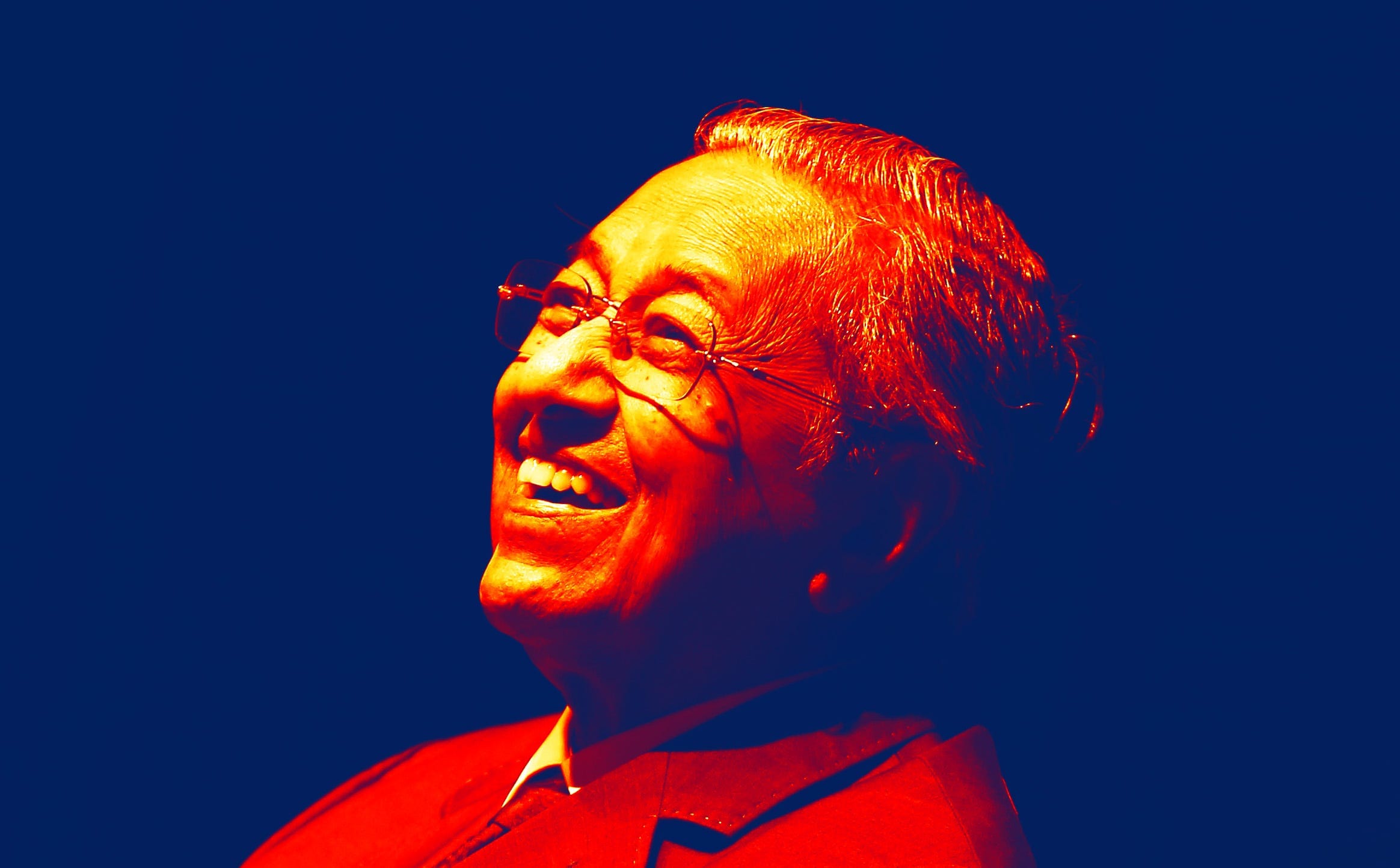Last year I published a highly popular article in which I explained why Mahathir must step down. It was no laughing matter then - the new Malaysian government kicked off its term with several controversial moves against its little neighbour, Singapore - threatening water deals that quench the city-state's thirst, freezing the joint high-speed rail project between the two countries, violating its territorial waters, wrestling over control over airspace and even banning some food exports to Singapore ahead of the upcoming Chinese New Year.
Of course, everybody who knows Dr M wasn't exactly surprised that his ascendancy to the second premiership brought his old methods employed in the 80s and 90s to the fore again. That said, the trajectory of the country under new leadership - expected to clean up after disgraced Najib and set the country on the right track - hasn't exactly produced what the electorate expected - though unlike in most countries, their various stumbles are usually rather entertaining to watch.
Hope(less)
Pakatan Harapan, translated as Alliance of Hope, promised just that to millions of Malaysians - hope that the country can be managed better than under its visibly corrupt predecessors. And there's a lot to tackle besides corruption - crime, pollution, urban planning, ethnic tensions and an economic future that remains somewhat uncertain given growing debts despite Malaysia's natural riches.
Unfortunately, the person who tipped the balance in favor of the coalition was the very same who was responsible for the ills of Barisan Nasional - Dr. Mahathir Mohamad.
And so, under his direction, Malaysian politics have become more a spectacle of internal political wrestling for power rather than a system propelling the country to a brighter tomorrow. Though, it has to be said that it does not really resemble a violent competition but more a comedy show a'la American WWE, with frequent (though rarely really sinister) plot twists.
Here are Mahathir, Anwar and Azmin in action:
The government's term started with a bang - though not exactly expected - with a rapid (and quite deliberate) deterioration of relations with Singapore. Nobody treated them really seriously, but they were quite an annoyance, and, in retrospect, it was more a comedy than a drama - and one that got rather funnier with time.
Today Malaysia is a country whose leaders pinch pennies over a mass transit link between Johor and Singapore - agreed between the two countries long ago - and yet, five minutes later, complain that the neighbour is unwilling to build new bridges that would cost several times more than the planned railway connection they want to save a few ringgit on.
We have witnessed so much muscle flexing over control of the airspace and how Malaysia wanted to reclaim "sovereignty" over its air operations last year, and now it has been downgraded by the American FAA for not meeting the basic standards of the International Civil Aviation Organization. Only five other countries (out of about 100 ranked) do not meet the criteria: Bangladesh, Ghana, Thailand, Costa Rica and Curacao.
"The downgrade means that the Civil Aviation Authority of Malaysia (CAAM) does not meet the International Civil Aviation Authority's (ICAO's) safety oversight standards and is deficient in one or more areas, such as technical expertise, trained personnel, record keeping and/or inspection procedures."
FAA's top category isn't an especially exclusive club either - so Malaysia was outranked by countries like Ethiopia, Suriname, Uzbekistan, Egypt, or even internally torn Venezuela.
In other words, Malaysian standards of air control slipped below that of a besieged, bankrupt South American regime of Nicolás Maduro.
So much for intimidating Singapore, then, which remains the premier aviation hub in Asia. In fact, Malaysian flailing airlines are now forced to piggyback on Singapore's national carrier - one of the best in the world - for survival (or perhaps even ultimate takeover - although MAS can't exactly be considered a precious asset).
Biblical "pride comes before a fall" is brilliantly performed by current Malaysian leaders.
But they have managed to achieve quite a bit more than merely annoying Singapore and getting a slap from the US over the lack of competence in aviation services. In a span of 18 months, they offended India - over their stance on Kashmir and endless protection of Islamic hate preacher Zakir Naik, who found refuge in the country - and got on the wrong side of the EU, which is restricting palm oil imports on environmental grounds. Malaysia even threatened Europe with retaliatory action - but that only prompted snickers, both in the West and in the country itself.
In less than two years Malaysian leaders who promised change and progress, have managed to fall out with both their nearest neighbors and farthest partners, while failing to impress at home.
Their latest defeat in a by-election in Tanjung Piai - where Mahathir's Bersatu contested a seat it won just a year ago and was now hammered 65% to 26% in favour of Barisan Nasional's old MP who coasted to reclaim the seat he lost in 2018, shows that the public's patience is growing thin.
Especially as the ruling coalition is marred by continuous infighting.
Madhouse
Indeed, Malaysian stumbles abroad are nothing in comparison to what's going on at home.
Ever since the coalition took over, the most pressing question was - when will Anwar replace the 94-year-old Mahathir? Dr M himself supposedly pledged to step down within 2 years - but he then repeatedly promised to hand the power over before retracting his statements just days later - like during the latest Doha Forum last week.
Though it's really hard to blame him after, earlier this year, Anwar quite honestly said that he wouldn't take the post of finance minister at the moment because the country doesn't have enough money and isn't growing fast enough.
It must be very reassuring for everybody that the most likely replacement for Mahathir clearly doesn't know how to improve the country's situation and a reality in which it is growing at nearly 5% per year is considered by him as quite dire.
In the meanwhile, conflict has broken out over leadership in PKR, the largest coalition party, headed by Anwar, with ambitious Azmin Ali - economic affairs minister in Mahathir's government and his frequent companion - exhibiting a desire to take over and perhaps even make a bid for future premiership.
Although that was somewhat stymied by accusations of homosexuality (what else?) that hit the newspaper headlines earlier this year, along with leaked videos reportedly secretly recorded in a hotel room where (allegedly) Azmin was caught entertaining another male in bed.
Not that the topic is something foreign in Malaysia - after all, Anwar himself was jailed for sodomy twice - under allegations which have just recently resurfaced for the third time, though the latest accuser went missing about as quickly as he had appeared.
At the same time, clearly not to be outdone, Najib Razak - Malaysia's disgraced former PM facing a trial over a massive corruption scandal - quite seriously testified that several hundred million dollars in his personal account came from the Saudi king himself (or so he was led to believe) who was supposedly so impressed with Malaysia's moderate brand of Islam that he wanted to support the leader of this great country with huge private donations. Right...
So, let's just sum it up, shall we?
Malaysia is a country soon to be governed by someone whose career was almost ruined by accusations of being gay (be it Anwar or Azmin) - and he would be replacing a nonagenarian who started the tradition about 20 years ago.

In the meanwhile, his predecessor - on trial for humongous corruption - tells the court that Saudis loved him so much that he was convinced they sent hundreds of millions of dollars to his private account for the impressive job he had appeared to be doing for his country.
With such people in charge, it's hardly surprising that last year they made a big row over controlling the country's airspace (part of which is ceded under Singaporean supervision to facilitate air operations at Changi airport) - only to end up red-flagged by Americans for lack of competence in managing it right now.
It's a country which brands itself as representing moderate, tolerant Islam, and yet six men have just been jailed for having a picnic on a Friday instead of attending prayers at the mosque - while it remains a safe haven for a hate preacher who says wishing Merry Christmas to Christians is a sin worse than murder.
And the list goes on...
Of course, you can find many stories about other countries as well. But they often balance the weird or silly with the quite serious. Malaysia, however, is not a country so poor as to inspire pity, nor is it so developed as to spark great respect or so powerful as to instil fear. Instead, it is a constant show in which all the top officials appear to be involved. And most of what they do is frequently so absurd that you're scratching your head as to how it is even possible for a single place to deliver so much entertainment so regularly for so long.
It is, sadly, no laughing matter for Malaysians themselves, who surely deserve a much more competent leadership. That said, at least their living standards are not exactly bad (as compared to almost everyone in the region except Singapore) so they can feel a certain relief that even if progress is not as fast as they were hoping, the comedy involving people in charge hasn't brought the country to a complete standstill. So the best they can do right now is just join the rest of us watching it with amusement until the next election is due.





